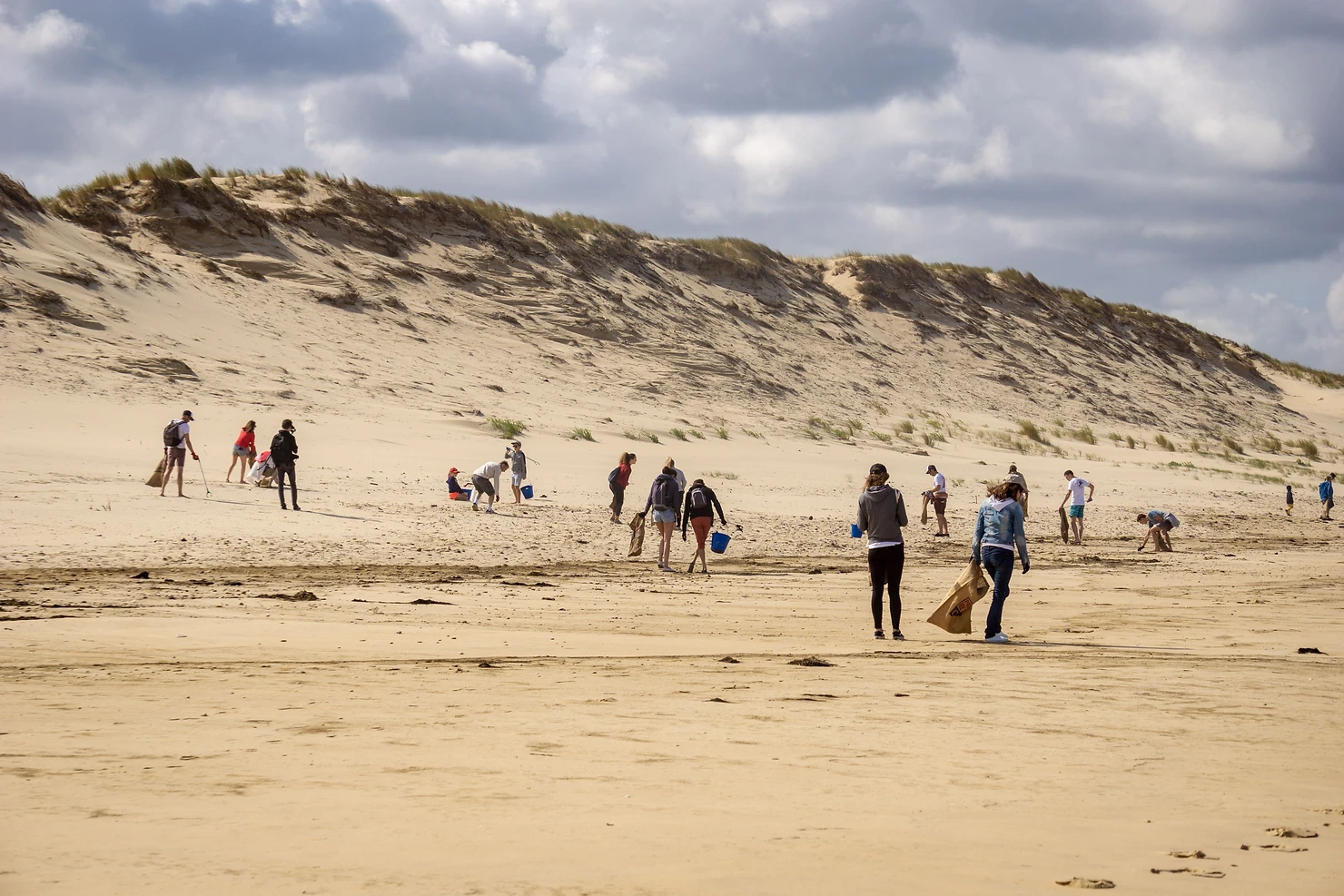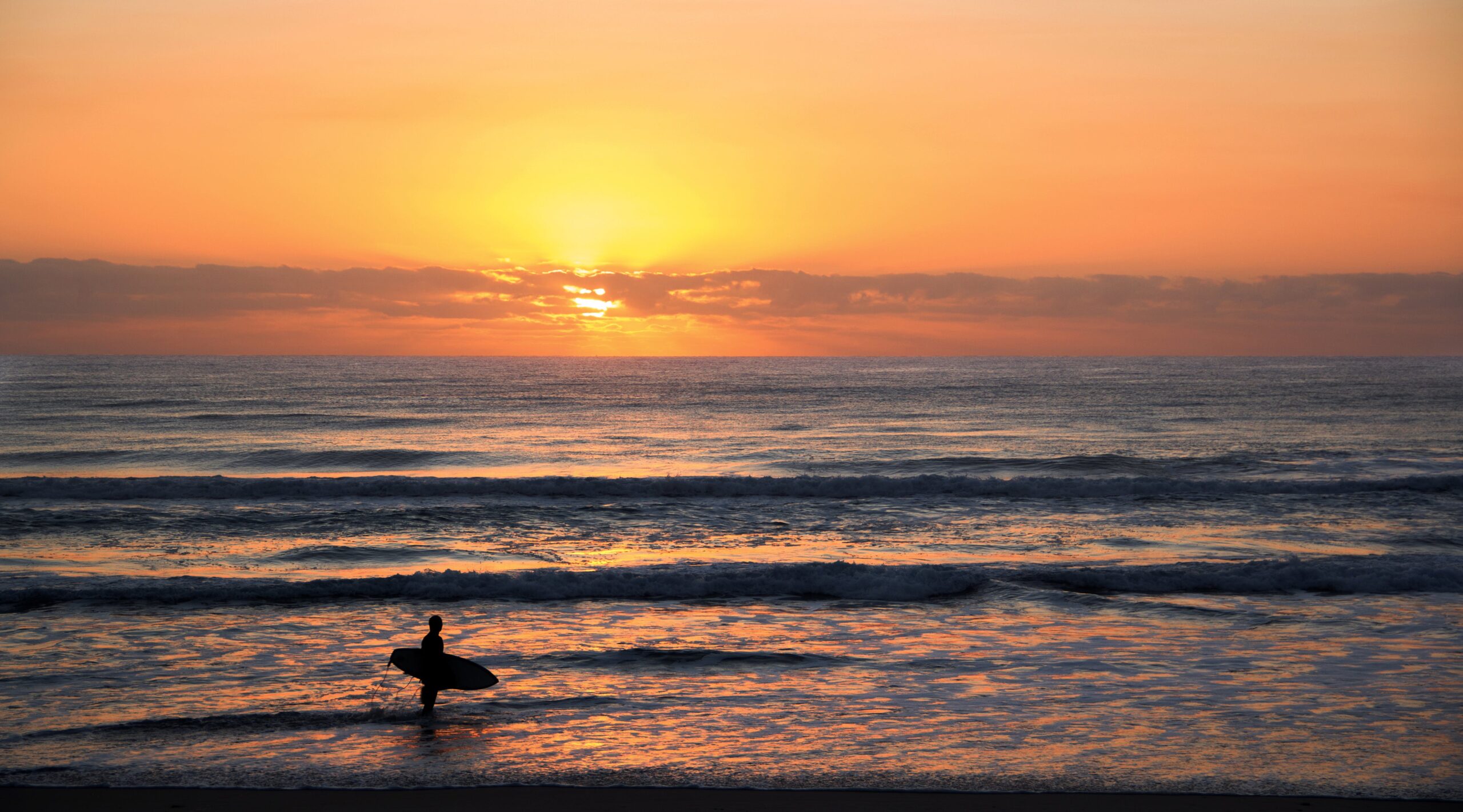After having been hidden in the shadows of famous surf spots at the Gold Coast in Australia, Waikiki Beach in Hawaii or Biarritz in France, Southeast Asia is slowly building its reputation as a surfer’s paradise.
The region is attracting an increasing number of people from all over the world – all looking for the best waves. Among these people were Nicolas, Basile and my friend Thomas. For the past three years, they have been catching waves all around this beautiful region.
The ocean, however, is suffering from increasing pollution. Many beaches are covered in plastic trash and every day the waves wash up more garbage. Thomas and his friends decided that things needed to be done.
Motivated to inspire other surfers to step up and help protect the environment, they went beyond just picking up trash at the beaches that they visited during their surf trips. They founded ‘Nomads Surfing’, a company that designs and promotes eco-responsible surfboard equipment as well as other upcycled products made from ocean plastics and old surfing materials.
While I personally am not a surfer – yet – I am a strong believer and supporter of all things recycled and sustainable. This is why I wanted to know more about them.
So, I met up with Thomas for coffee and had a chat. This is what he shared with me…
About Nomads Surfing
From left to right: The founders of Nomads Surfing Nicolas, Basile and Thomas.
What inspired you to start Nomads Surfing?
I have been living in Kuala Lumpur for almost 5 years. During that time, I had the opportunity to catch amazing waves all across Southeast Asia. The crystal-clear water and white beaches in this part of the world are what made me go back to these places over and over again.
These places look like paradise – on the surface.
When I started to look more closely, however, I realized that this was just a facade. All these places are actually suffering from pollution. There is trash everywhere.
In 2017, me and my friends with whom I share my passion for surfing decided to join our passion for this amazing sport and our commitment to fight against plastic pollution by launching Nomads Surfing.
Preserving the oceans is of utmost importance for us!
Our goal is not only to help to preserve the environment but also to reduce the environmental impact that surfing may have on the environment.
***

In our company we pursue two main goals:
1. Changing the Surfing Industry: Much of the conventional surfing equipment is made of petroleum by-products. We want to inspire change in this industry by using more eco-friendly materials in our products.
Our surfboards for example are made from polystyrene foam blanks. We use 25% recycled materials and the foam is also fully recyclable. For the board, you also need resin and fibers. Our resin is 40% plant-based; and we combine it with natural fibers such as flax and basalt.
To ensure quality and sustainability, we got the entire production process certified by an independent organism called ECOBOARD PROJECT.
Aside from our surfboards, we will soon also launch surfing fins made of recycled plastic which are made from discarded fishing nets collected in the ocean.
We are particularly proud of this product because we are able to make great products out of the waste that would otherwise continue to pollute our oceans and threaten marine life.

2. Raising Awareness for the Importance of a Clean Environment: We want to raise awareness about the importance to preserve our environment and keep it clean from plastic waste.
Some of our profits, therefore, go to our carefully selected NGO partners in France, Malaysia, and the Philippines
***
Aside from surf fins what other “upcycled products” are you planning to sell?
One of Nomads’ main goal is to reduce our impact on the environment while surfing. For that reason, we started designing new products made of waste material that is coming from the ocean, as well as materials that are used for surfing.
Take surf competitions for example. Once the event is over, there are plenty of vinyl banners that are of no use anymore. We started collecting them and turn them into new products including bean bags, travel bags for surfboards, little pouches, laptop cases, and backpacks.
We are producing these items with a social association in their workshop in Bordeaux.
“This way, we are hitting two birds with one stone. We reduce the consumption of raw material while having a positive social impact.
Nomads Surfing and NGOs

Which NGOs are you working with?
Nomads Surfing has selected three NGOs in three different countries to work with. Convinced by their dedication to preserving the environment, we are giving 5% to fund their projects.
France: Project Rescue Ocean runs action to depollute beaches, rivers, and harbors; as well as bringing awareness on the plastic pollution global issue.
Malaysia: EcoKnights (EK) educates Malaysian communities and mobilize them around sustainability. They drive numerous environment projects to bring awareness including tree planting, waste collection activities, and many more.
Philippines: The Coral Triangle Conservancy (CTC) intents to develop a Protective Marine Area in Coron while fighting against illegal fishing.
***
What are the milestones that you have already achieved through your collaboration with these NGOs?
One of the milestones that we have achieved in June 2019 was the fundraiser in Kuala Lumpur. Nomads Suring together with EK was able to raise 10,000 RM (around 2,350 USD). This money was used to give 50 trees to community groups and school environmental actions. EK was also able to install 12 water filters for Malaysian families selected by the NGO.
Motivated by the success of last year, we were hoping to organize a similar event this year. Unfortunately, we had to postpone it due to the pandemic.
Last year, we also met CTC’s founder Scott while working on a project with Coral Triangle Conservancy. We had a chat and decided to make a documentary about the great efforts of this NGO.
The documentary is called NOMAD. Seeing it being selected for various Environmental and Surf Festivals in Italy, France, Croatia is very rewarding. It has also been selected for the Kuala Lumpur Eco Film Festival in October 2020. Recently the documentary was also awarded at the Portuguese Surf Film Festival in the Sustainability Category.
About the Founders

Where in the world are your favorite surf spots?
It is hard to name only one spot. Dozens of places come to our minds. Nicolas is an aficionado of Bordeaux and his region. What he likes the most is getting lost on the Atlantic coast searching for new secret spots.
Basile has spent many years in the Philippines. He collected some of his best surfing memories there. One area he particularly likes is the North-East of Siargao island which is surrounded by some of the most pristine waters that we have ever seen.
I surf mostly in Indonesia and fell in love with a place called Krui, on Sumatra Island. It has an amazing left which is extremely powerful and that can last for hundreds of meters. It is definitely worth the long journey to this remote location.
***
What fascinates you about surfing?
It is a never-ending process of learning, about wind, waves, swell, and weather. What also excites me is that there is no session like the previous one. The key is to connect with the ocean and learn how the waves form and evolve.
Another thing that always fascinates me is how much you can achieve with so little equipment. All you need is a surfboard.
Another thing that I like about surfing is that it is one of the toughest sports I ever practiced. It requires endurance, flexibility, and power. Unlike skiing or skateboarding, the “surface” you balance on is moving. This feeling is quite hard to grasp at the beginning and makes the learning process extremely challenging and of course interesting.
Surfing and the Environment

What are the things that you can do to be an environmentally friendly surfer?
The best waste is the one we do not produce.
I like to use this saying because over 90% of plastic isn’t recycled. We, therefore, must focus more on reducing rather than recycling.
When recycling is not an option, try to follow some of the other principles such as Refuse, Reduce, Reuse, Repair, or Rot.
We are selling surfboards, but we always advise our customers to try and repair his or her surfboard first or get a second-hand surfboard. If those two steps have failed, then only you should consider getting a new board.
To promote this behavior, we have implemented vouchers for those who buy new boards from us while bringing us their old surfboards. We crush the old boards and use the foam to fill beam bags for example. Beam bags are part of the upcycling products that we are selling.


